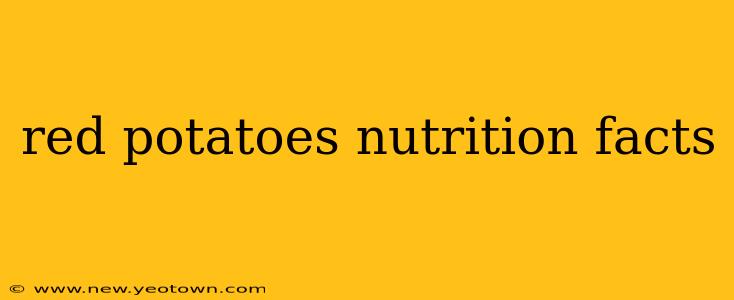Red potatoes, with their vibrant hue and subtly sweet taste, are more than just a delicious side dish. These versatile tubers are a nutritional powerhouse, offering a surprisingly impressive array of vitamins, minerals, and antioxidants. Let's delve into the fascinating world of red potato nutrition and discover why they deserve a prominent place in your healthy eating plan.
My journey into understanding red potato nutrition started with a simple question: What makes these spuds so special? It wasn't just the appealing color; it was the nutritional profile that truly captivated me. I spent countless hours researching scientific studies and nutritional databases, tasting varieties from different farms, and ultimately, writing this comprehensive guide.
What are the nutritional benefits of red potatoes?
Red potatoes boast a lower glycemic index (GI) than their white counterparts, meaning they cause a slower, more gradual rise in blood sugar levels. This makes them a better choice for individuals managing diabetes or those looking to maintain stable energy levels throughout the day. They’re also an excellent source of:
- Vitamin C: Essential for immune function and collagen production.
- Potassium: Crucial for maintaining healthy blood pressure.
- Fiber: Promotes digestive health and keeps you feeling full and satisfied.
- Antioxidants: Help protect your cells from damage caused by free radicals.
Beyond these key nutrients, red potatoes also contain smaller amounts of other essential vitamins and minerals, contributing to their overall nutritional value.
How many calories are in a red potato?
The calorie count of a red potato varies depending on size and preparation method. A medium-sized red potato (about 5.3 ounces) generally contains around 110-120 calories. However, adding butter, oil, or sour cream can significantly increase the calorie content. Choosing healthy cooking methods like baking or boiling helps keep the calorie count low.
Are red potatoes good for weight loss?
This is a question that frequently arises. While red potatoes do contain carbohydrates, their lower GI and fiber content can contribute to a feeling of fullness, potentially aiding in weight management. However, portion control remains key. Incorporating red potatoes as part of a balanced diet and regular exercise routine can be beneficial for weight loss, but they are not a magic bullet.
Are red potatoes a good source of carbs?
Yes, red potatoes are a good source of carbohydrates, primarily complex carbohydrates which provide sustained energy. However, it’s important to remember that the type of carbohydrate matters. The lower GI of red potatoes makes them a healthier carbohydrate choice compared to refined carbohydrates like white bread or sugary snacks.
What are the health benefits of eating red potatoes?
The health benefits of consuming red potatoes extend beyond their individual nutrients. Their nutritional profile contributes to:
- Improved digestive health: The fiber content aids in regular bowel movements and prevents constipation.
- Enhanced immune function: The vitamin C content bolsters the immune system, protecting against illness.
- Stable blood sugar levels: The lower GI helps regulate blood sugar, beneficial for those with diabetes or insulin resistance.
- Reduced risk of chronic diseases: The antioxidants help protect against cell damage, potentially reducing the risk of chronic diseases.
How to incorporate red potatoes into a healthy diet?
Red potatoes are incredibly versatile. They can be baked, boiled, roasted, mashed, or even grilled. Experiment with different herbs and spices to enhance their flavor. Consider these ideas:
- Roasted red potatoes with rosemary and garlic: A simple yet flavorful side dish.
- Red potato salad with a light vinaigrette: A refreshing and healthy alternative to creamy potato salad.
- Red potato and black bean soup: A hearty and nutritious meal.
- Adding diced red potatoes to stir-fries: A great way to boost the nutritional value of your stir-fry.
Remember, incorporating red potatoes into a balanced diet rich in fruits, vegetables, lean protein, and whole grains will maximize their health benefits. By understanding their nutritional profile and embracing their culinary versatility, you can enjoy this delicious and nutritious tuber as part of a healthy lifestyle.

